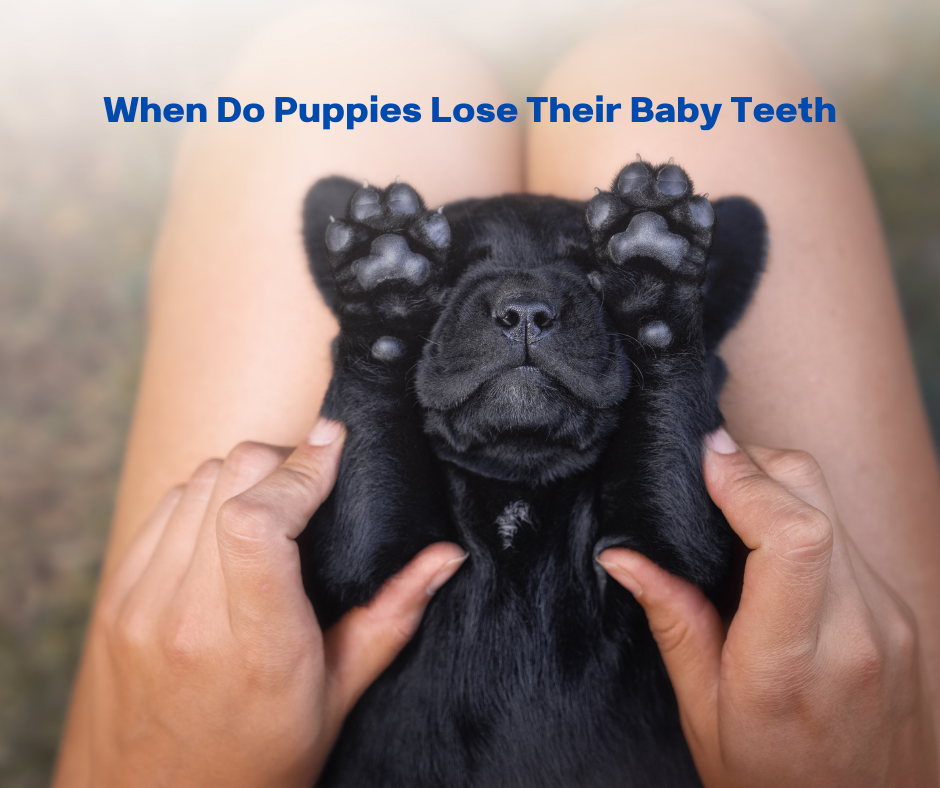
Congratulations on your decision to bring a new puppy into your family! Whether it is your first dog or you’ve had a puppy for a long time, there’s a lot of learning involved about what to expect and how to manage various changes in your puppy as they mature.
The teething phase is the subject of this article. (Yes, pups, like human infants, have baby teeth that fall out!) We’ve put up a puppy teething timetable so that you know what to anticipate as your pet develops into his adult form.
When Do Puppies Lose Teeth Timeline

Weeks 2 through 4:
When your puppy’s baby teeth begin to appear, he will remain with his mother and breeder. His eyes will have opened by this time, and he will continue to feed.
Weeks 5 and 6:
All of your puppy’s baby teeth should have developed by now. Dogs typically have 28 baby teeth in total. Around this time, the breeder will have weaned the pups in the litter or will be in the process of doing so as they learn to consume wet, soft puppy kibble.
Weeks 12 through 16:
This is about the time you’ll be able to take your puppy home with you (some breeders allow pups to go to their new owners’ home at eight weeks, while others wait a month or two longer, based on the breed and the particular breeder’s preferences).
This is also the period when you may see little crumb-to-rice-sized teeth throughout your house when your puppy’s baby teeth begin to fall out and permanent adult teeth appear. Anyone who has ever looked for a teething baby understands how unpleasant this process can be! At this stage in his growth, it would be beneficial to provide your puppy with safe chew toys, like a Kong or Treat Pod toy. Also, have your veterinarian examine your puppy’s mouth to ensure that everything is working properly.
This time is also essential for socialization or acclimating your puppy to different discoveries in a low-stress environment. There’s a lot to this process, but while we’re on the subject of teeth, now is a good time to start feeding your puppy’s mouth, both inside and out. (Be cautious not to pinch him; those remaining puppy teeth are razor sharp.) By doing so, you’ll be preparing your puppy to love (or at least accept) having his teeth cleaned.
Six months and up:
All of your dog’s puppy teeth should have fallen out by the time he’s six months old, and his adult teeth should have grown in. Adult dogs have 42 teeth on average (approximately ten more than humans!). If you find any remaining baby teeth, notify your veterinarian immediately as they may need to be extracted.
Keeping the Teeth in Good Condition
Your puppy’s mouth is now full of pearly white chompers, and it’s your responsibility to maintain them that way. Dogs lack the foresight to use their tongue to remove chewed food from their teeth, which, when coupled with plaque in the mouth, may result in foul breath and, if the periodontal disease develops, severe medical issues.
Brushing your dog’s teeth may help you avoid or reduce the need for veterinarian cleanings, which typically require anesthesia.
Begin by cleaning the teeth lightly with a finger brush or gauze pad. Later on, you’ll be able to move to a toothbrush and canine toothpaste. Toothbrushes should be gentle, and toothpaste should be designed specifically for a dog’s digestive tract. If your dog eats human toothpaste, it may cause gastrointestinal discomfort. Teeth may also be cleaned using baking soda and water paste.
There are other meals, snacks, and other items available to assist in decreasing plaque. Look for items that have the Veterinary Oral Health Council’s mark of approval. A list may be found here. Check out our puppy teething bundle for additional assistance with your teething puppy, which contains toys, snacks, and more!
Teeth on both sides
One issue you may not have observed about your pup is that the adult teeth are growing behind the baby teeth, and you aren’t aware of it. When the adult teeth emerge, they will force the puppy teeth out. A puppy tooth will sometimes stubbornly remain in place even after the adult tooth has completely erupted behind it. You may need to take the baby to the veterinarian and have their teeth removed to correct the issue.
We have also known pups that waited up to eight months to lose all of their developing teeth. So please don’t give up. Mother Nature will soon work her magic and force those razor-sharp teeth to the surface. And don’t be shocked if they fall out and you don’t locate them. Puppies chew and swallow them with little fanfare.
Best wishes as you guide your new puppy through the joyful first few months of his life!
